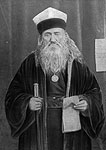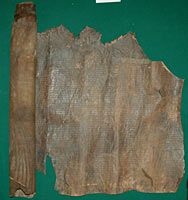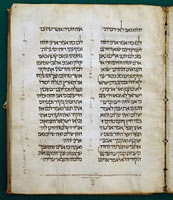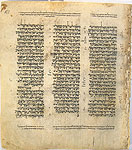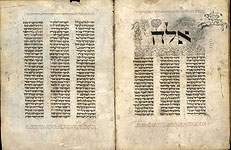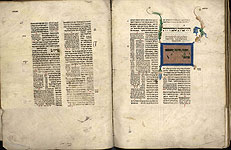First Firkovich Collection
The major portion of acquisitions occurred in the period between 1862 and 1876, and they are associated with the name of Abraham Firkovich (1787-1874). Born in Karaites family in Crimea (then part of the Russian Empire), he was a famous Karaim writer and cleric, a community leader and teacher, an antiquarian and archaeologist, an owner of a publishing house and bibliophile. Firkovich was a passionate collector of ancient manuscripts relating primarily to the Karaites, but he did not limit to them.Firkovich collected a vast number of Hebrew, Arabic and Samaritan manuscripts during his many travels. What later became known as the First Firkovich Collection contained more than 1,500 handwritten books and documents, mainly in Hebrew (Fig. 7, 23). Some of them belonged to his family or were acquired in the places where Firkovich lived - in Lutsk and Evpatoria, the other part was collected during his travels to Jerusalem and Istanbul, across the Crimea, the Caucasus and Lithuania. 'Wishing to keep these rarities in the fatherland,' Firkovich did not want to sell them to 'foreign individual scientists and societies' and offered Director of the Public Library Modest Korff to buy them.
A special commission of the Russian Academy of Sciences studied the collection during the year to understand its value. The experts prepared a report in which it was appraised very high. In 1862, at the request of Alexander II, the Ministry of the Court allocated 125 thousand rubles for the purchase of the collection. The sum was extremely large for the day and exceeded the annual budget of the Library for the acquisition of manuscripts tenfold. The next year, the Library obtained codices (manuscripts in a book form) and scrolls which Firkovich assembled during his "archaeological expeditions" in the Crimea, later sent to store in the Odessa Society of History and Antiquities and eventually transferred to the Imperial Library in St Petersburg.
These include a fragment of a dark brown leather scroll of the Torah (Pentateuch) approximately dated to the 9th-10th centuries and the Last Prophets of 916. The latter is notable not only for its date but for the text written with the Babylonian system of vowels in different syllables, rather than the Tiberian vocalization marks which the majority of Hebrew manuscripts had. Its facsimile edition was published in 1873 under the title «Codex Babilonicus Petopolitanus».
Another ancient manuscript - the famous Cairo Bible, of the year 1010 (better known as the Leningrad Codex) - is the oldest complete dated manuscript of the Bible in Hebrew. 16 illuminated "carpet sheets" at the end of the book are luxuriously decorated: lines of the final Masora (Masoretic notes - comments) form a geometric pattern, and the gaps between them are filled with colourful floral ornaments. (Fig. 6). The text of the Leningrad Codex was reproduced in the printed edition of Kittel and Kahle’s «Biblia Hebraica» published in 1927.Both codices, as well as some others, for example, the book of poems by Karaite poet Moses Dari, were created in the Middle East. However, most of the manuscripts of the First Collection were produced in the territory of the Russian Empire or the European countries. For instance, the Pentateuch with Targum Onkelos (Aramaic translation to the Torah)was copied in the 14th century in Germany or France, or Moses Maimonides’ Mishneh Torah was rewritten in Northern Italy in the 15th century.
